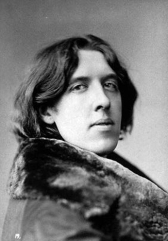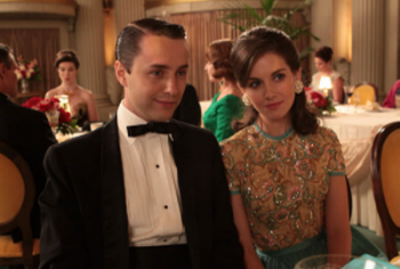Mad Men has hit a point where it's established the situation so well that just seeing the interaction of the characters is enough for a thoroughly entertaining episode, such as
"The Beautiful Girls."
Don and Dr. Faye are having an affair. Looks like she's the great romance this season. Don used to go for brunettes, but since he lost Betty, he needs a blonde. (Their pillow talk includes a mention of "Chinese walls"--always a fun phrase.)
Roger's book concept doesn't seem to be selling. Meanwhile, he and Joan have words. He finds out Joan's husband is being shipped to Vietnam aftter basic. (You can hear everyone's fingers being crossed, hoping he'll die. Will Weiner defy audience expectations?) He's still making plays for her, even though that ship seems to have sailed.
Joyce, Peggy's Lesbian friend, drops by. The boys in the office love to talk about Lesbians--some things never change. Peggy's partner sings "Downtown." Big hit in 1965. Then the gals go to a bar and we hear Pet Clark's "I Know A Place," her fairly successful follow-up. Do they have a deal with
Tony Hatch? Turns out Joyce is setting Peggy up to meet Abe, whom we last saw at a Village happening.
At Joan's lonely home, Roger (anonymously) has sent a present--massage, manicure, pedicure. Very nice.
Back at the bar, a very interesting conversation. Peggy and Abe talk about civil rights, which was certainly an issue back then, but is a minefield for writers today. It's just too easy to have the characters be too knowing, or too foolish. Abe, of course, is for civil rights, and he sees revolution in the air. Sure, why not? Peggy tries to steer the conversation toward safer shores. Abe has no patience with evil corporations, such as Peggy's client, Fillmore Auto Parts, which won't hire blacks down South (though such discrimination had recently been banned). He lectures Peggy about civil rights, and Peggy states that women have it just as hard. Abe treats her complaint almost as if it's a joke. It's true that many Eastern white male liberals of the time just didn't want to deal with this problem, and could be quite condescending about it (even though the Civil Rights Act of 1964 banned discrimination by sex as well as race), though Peggy might be sounding just a bit too modern. Abe uses the word "racism." Was that in common parlance then? (Didn't Captain Kirk used the phrase "race hatred.")
Peggy goes on to say that blacks can make it just like women--by forcing themselves in, not by the law helping. This was another common point of view then--JFK had it, for one. (It's also around today, I suppose, though we're so steeped in the language of civil rights that the argument is mostly about what's the right way for the government to get involved.) Anyway, the conversation doesn't go well. Peggy leaves, not wishing to be criticized any more. Abe, stay away from politics and religion.
Back at the office, some gags with Blankenship and Bert. Funny, but maybe a little too easy. Joan goes into Roger's office to thank him. Things are good again. Or are they? He wants to go out to dinner, and Joan is disappointed. I liked them better when they were hot and heavy.
Abe comes into the office and has written something for Peggy. It's a denunciation of Fillmore, maybe he'll publish it. Speaking of which, Fillmore's now meeting with Don, Ken and Faye. (No Pete this episode). Fillmore's small, family-owned. They're not happy about the boycott over their policies either, but
the three guys in charge can't agree on how to deal with it. It's interesting how they seem to be auditioning for Don, not the other way around. (Ken is pretty feisty too, and seems willing to take on Don.) I guess he's the wizard of Madison Avenue.
Don's called out of the meeting. Sally ran away and made it to Cooper Sterling. He's not thrilled, but Sally obviously adores her dad and hates her mom. He calls Betty who's surprised, but says she's your problem till tomorrow, good luck.
Peggy reads the piece. Abe thought he was doing her a favor, but it'll be the end of her job. She's tears it in half, saying she's not a political person. He insists she is anyway. Okay, but when feminists start saying the personal is political, he may not be too pleased. (Good thing Paul's no longer around--he'd be driving Peggy crazy.)
Peggy returns to her office and sees Blankenship sleeping. Nope, she's dead. That's a surprise, and yet this was the episode where I'd felt they'd gone as far as they could with her character, so good timing.
So Don has to leave the meeting yet again. Lucky they have Joan, who knows how to deal with a crisis. (This is nothing next to "Guy Waks Into An Advertising Agency.") They've got to get her out of there without letting Sally or the Fillmore trio know. (Some visual humor ensues--almost farce--which they seem to be emphasizing this season.)
Don has Faye bring Sally to his apartment. Faye, usually calm, isn't quite prepared, but does her best. Soon they're wheeling Blankenship out. Hot damn, Don's got a beautiful secretary again. Joan goes to see Roger. She passes by Harry laughing at a classic old Irish joke. Joan and Roger have a drink. Okay, now they can go out to calm down.
Faye's watching Sally, who's quite comfortable at Daddy's place. Faye has watched over her, but is ready to leave now. Too much for her?
Joan and Roger go to a deli--an old haunt where no one will know them. They have a nice talk, the kind they haven't had in a while.
At Don's place, Sally wants to know about Faye. Don won't say everything, but admits she's a friend from the office. They get the pizza Sally was asking for.
Joan and Roger walk home. Now it's a bad neighborhood. They're mugged. The show deals with civil rights, but a huge issue in the 60s was the rising crime rate. The two give up everything, because that's what smart New Yorkers do. After it's over, they start making out (and then some). Who wouldn't?
Don puts Sally to bed. She'd like to stay with him all the time. Next morning, homemaker Sally (looking more like her mother every day) makes French toast. He decides to clear his morning schedule so they can go to the zoo.
At the office, Bert and Roger and trying to write Ida's obit. We discover Bert has no office(?). So that's why he hangs around everywhere. Roger calls Joan in. After Bert leaves, they talk for the first time since last night. They had a moment, even if there doesn't seem to be anything to do about it.
Sally comes in to the office with her dad. Don drops in on a meeting about Fillmore and tells them what to do. Heck of a job he's got now. Didn't he used to actually work? (Back then perhaps business was more genteel, and if you'd made it, you could take it easy.) They discuss who'll sing the jingle, and Peg suggests Harry Belafonte, bringing up the race issue. Don answers her like she answered Abe--their job is to serve the client, not make political statements.
Betty will be there soon and Sally doesn't want to go. Don bring Faye in to help, but she can't do anything (I'm a doctor, not a child psychologist!). Sally runs away and falls down before accepting her fate. When she meets Betty at reception, half the office comes by to see the notorious Mrs. Francis.
Just then Joyce drops in to see Peggy. At Don's office, Faye is unhappy--at Don, but mostly at her failure to deal with Sally. Don does a good job of calming her down, saying it's not her fault. (Is this
Good Will Hunting?) They hug and kiss. (He also has a little drink, but seems overall to have dealt well with his drinking problem.) At Peggy's office, Joyce offers her theory about men and women--women are the pot, men are the soup, and who wants that? Peggy doesn't quite agree.
Peggy leaves the office, gets on the elevator, and we end on a beautiful tableau of the "beautiful girls" Peggy, Joan and Faye. They're what the episode's about. Each having trouble dealing with their man, each at a different level in their relationship, each not sure what the next step should be.
There was a lot of activity, but even with Blankenship's death, not a lot of forward movement in the episode But then, if you want forward movement, you're watching the wrong show. Of course, we're getting near the end of the season and I expect the basic plot to heat up a bit--presumably something big will happen--most likely something about the agency, and maybe something about someone's marriage.
PS I've been informed Pete helped haul away Blankenship.











